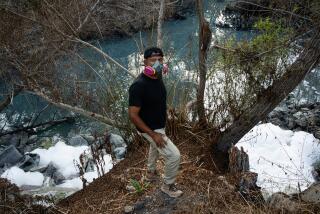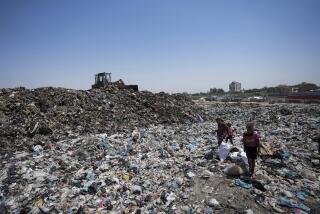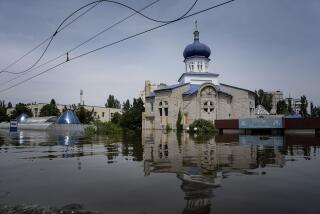Air Quality an Overlooked Casualty of War
- Share via
BAGHDAD — A massive generator outside the Ministry of the Environment belches smoke, drips oil and roars above the noise of traffic, glaring testimony to the low priority given to protecting air quality in the warravaged Iraqi capital.
Gas flare-offs from oil fields, smoldering fires along sabotaged pipelines, groaning generators on every street corner have spread a gray haze over much of Iraq, aggravating respiratory problems and threatening caustic inversions as people brace for the dreaded heat of summer when temperatures climb past the 120-degree mark.
Electricity Minister Muhsin Shalash warned recently that the ad hoc gasoline-run electricity generators already blighting Baghdad would continue to proliferate as the mercury climbs between now and September and residents rely on them to run air conditioners and appliances.
“The situation is dire, and it won’t improve for years,” Shalash said, recalling that Iraq had the best electricity system in the Middle East before two decades of war and international sanctions derailed maintenance and investment.
More than two years after the fall of President Saddam Hussein, with reconstruction programs running well behind schedule because of the widespread insurgency, residents of Baghdad dependent on the public power grid usually get only six to eight hours of service per day. The electricity usually comes in three increments, separated by four- to six-hour blackouts.
With the nation’s power plants producing about 65% of pre-invasion output, according to Shalash, tens of thousands of Iraqis have taken matters into their own hands by buying gas-powered generators or tapping into miniature electric stations set up illegally in their neighborhoods.
In a country where gasoline is traditionally cheap and plentiful, enterprising technicians have been installing and maintaining large generators and running power lines to homes on a pay-per-hour basis. Foreign advisors to the Iraqi government complain that the upstart generator operators are competing with state-run power plants for diesel fuel being imported to compensate for production shortfalls.
“You find at least two large generators in every street, and most homes have their own small one,” said Hifa Abed Kareem Nosaif, a physicist and senior analyst at the Environment Ministry.
Nosaif estimates that the number of gas-fired generators has increased 50-fold in the capital, where wealthy and middle-class Iraqis can augment the paltry public power supply to run air conditioning and televisions, two services many consider vital now that traditional pastimes such as strolling and cafe visits are unsafe because of the ongoing insurgency.
Until government power generation can meet demand, officials concede, authorities have no leverage to persuade citizens to pull the plug on the improvised power supplies blamed for much of the air pollution.
Adding to the noxious cloud hovering over Baghdad is the swelling fleet of aging vehicles and their emissions. More than 1 million cars have been imported in the last two years, many of them older models that fail to meet current licensing standards in Europe.
“The level of contaminants in the air has more than doubled since the war, and vehicles are responsible for 60% of the contamination,” said Raad Mohammed Saleh, head of the ministry’s air quality department.
“We need at least five years to correct the current problems, and only then given the right equipment and technology and proper international aid,” he lamented.
Environmental engineer Suzan Samy has studied the effects of suspended particles on those with respiratory illnesses and concluded that the number of patients seeking medical help tripled on days when atmospheric conditions caused the pollutants to be trapped at ground level.
“The contamination directly influences the health of Iraqis living in Baghdad,” she said.
At the capital’s Asthma and Respiratory Hypersensitivity Center, director Shakeer Saffar says comparison of patient complaints in 2001 with the volume now handled by the center shows a dramatic increase in asthma and bronchitis cases. He declined to provide statistics, noting that treatment interruptions, disrupted medical supplies and the loss of professional staffers since the March 2003 invasion made it difficult to determine how much of the increase was attributable to heightened pollution.
Visitors to the medical center contend that their ailments are a direct result of the worsening air quality.
Ziad Saafy brought his 3-year-old daughter, Noor, to the respiratory center early this month after the latest of dozens of attacks of allergic bronchitis.
“All the doctors advise me to keep her away from the polluted air that is triggering the attacks, but how can I do that? She’s even affected by car exhaust and the electric generator near our home,” Saafy said of his wheezing daughter.
In addition to the smog, the Tigris and Euphrates rivers are being polluted by new and old industries that dump their wastes into the waterways, Nosaif said. The thriving cement and brick factories turning out construction supplies for the post-invasion repair boom are the worst culprits, he said.
“The owners of these establishments have no fear of any authority and continue dumping their wastes into the rivers because it is easier and cheaper than proper disposal,” he said.
Infectious diseases such as typhoid and hepatitis are on the rise from sewer-system damage that allows wastewater to mix with drinking water and from oil spills into the rivers caused by insurgent attacks on pipelines, he added.
Little progress has been made in repairing leaks and breakages, Nosaif said, because neither Iraqi technicians nor U.S.-led forces can work safely at the sites that, like the rest of the country, are vulnerable to insurgent bombings and drive-by shootings.
The United Nations Environmental Program and advisors from the U.S. government are at work with Iraqi officials to identify objectives to be contained in a new environmental law. Once the component rules and regulations are specified, the law will be drafted by a Middle Eastern law firm and presented to the transitional Iraqi National Assembly by fall, those guiding the process said.
“We believe Iraq to be an important member of the international community, and as such they will need to have an environmental law that in some way reflects international environmental standards if they are to succeed in attracting investments as well as money from donor nations,” said Keith Easton, a U.S. environmental lawyer under contract with the Environment Ministry.
But both Iraqi and foreign experts are wary of the clout wielded by the ministries for oil and electricity, the former providing about 90% of Iraqi national income and the latter under intense social pressure to improve the power output. Those operations account for much of the air pollution, but neither the government nor the population is probably willing to sacrifice lifestyle-improving production for better environmental protection.
Times staff writer Caesar Ahmed contributed to this report.
More to Read
Sign up for Essential California
The most important California stories and recommendations in your inbox every morning.
You may occasionally receive promotional content from the Los Angeles Times.











